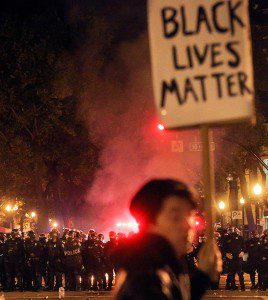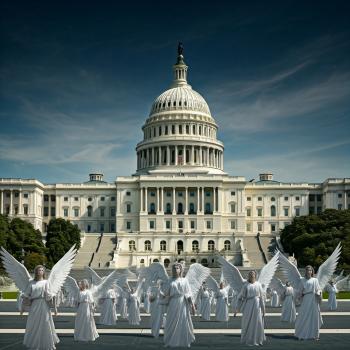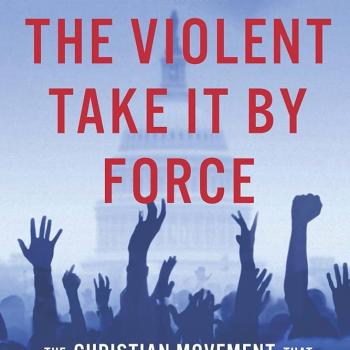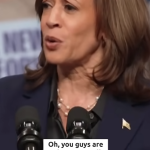As several recent posts here show, I’m not terribly optimistic about the capacity of white evangelicalism to confront and correct its longstanding complicity in America’s sins of white supremacy, racism and injustice.
The history, spirituality, hermeneutics and religious ideology of white evangelicalism just seem too intertwined with racial injustice. To sever those connections would require a radical transformation — so radical that it would no longer be white evangelicalism, but something else, something different and new. And evangelicals are conditioned to fear that kind of radical change — to regard it as apostasy, a falling away, a form of rebellion.
Witnessing much of the white evangelical reaction to Ferguson and to the killing of Eric Garner has only made me less optimistic. Consider, for example, the horrible “Christian” responses to Christian rapper Lecrae’s recent tweet about Ferguson. Or the hideous commentary that gushed out when popular white evangelical blogger Jen Hatmaker wrote a modest plea for white Christians simply to listen to what black Christians are saying.
Or consider the many churchified attempts to derail, dismiss or distract from any focus on the black lives taken with impunity. The “black-on-black crime” garbage, or the fatuously pious version of that dodge that focuses on black women and abortion. (Because what could be more “pro-life” than to ignore or defend the killing of unarmed people in the street?)
Hate and ignorance are plenty ugly on their own, but add a thick layer of sanctimony and they look even worse. So all of that has been incredibly disheartening to witness.
But last week also brought one encouraging glimmer from a surprising source. Russell Moore, the main official spokesman for the Southern Baptist Convention, has been loudly and clearly denouncing the injustice of the non-indictment in the killing of Eric Garner. On the denomination’s radio program, Moore expressed what seemed to be heartfelt anger:
I’m sitting here wondering what could possibly be the explanation for this. I mean, there is no excuse that I can think of for choking a man to death for selling illegal cigarettes. This is about cigarettes. This isn’t a violent confrontation. This isn’t a threat that anybody has reported, a threat of someone being killed. This is someone being choked to death. We have it on video with the man pleading for his life. There is no excuse for that I can even contemplate or imagine right now.
… I have gotten responses and seen responses that are right out of the White Citizen’s Council material from 1964 in my home state of Mississippi, seeing people saying there is no gospel issue involved in racial reconciliation. Are you kidding me? There is nothing that is clearer in the New Testament that the gospel breaks down the dividing walls that we have between one another.
Moore has repeated this message and expanded on it since then — see this Washington Post interview for more from Moore. This is remarkable, especially when you consider that Russell Moore succeeded Richard Land less than two years ago as head of the Ethics and Religious Liberty Commission of the Southern Baptist Convention. I said then that Moore represented a change in tone, but not in substance, but his response to the slaying of Eric Garner shows that’s not always true. This is a dramatic and substantial change from the kind of rhetoric Land regularly spewed when he ran the SBC’s ethics commission. If Land were still running the show, the ERLC’s radio program would be denouncing Moore’s comments and anyone who agreed with them.
This is a real difference, not just a matter of style. Richard Land is a man who was concerned with wanting to not be perceived as racist. Moore, on the other hand, sounds like a man who has decided he does not want to be racist. And, to his credit, he even seems to recognize that this will not be as simple as his wishing it so.

It will be interesting to see how this unfolds. Russell Moore remains a part of the Louisville-based conservative culture-warrior Southern Baptist movement led by Southern Seminary president Al Mohler. Mohler and his Mohlerettes — Denny Burk, Owen Strachan, etc. — haven’t yet stepped up to support Moore as he sticks his neck out. They seem instead, like Richard Land, to be casting about for something to say that can make them appear less racist, without having to change anything else they say. (Recent posts on Burk’s blog include a tone-deaf endorsement of Charles Barkley as an acceptable example of One of the Good Ones, along with an enthusiastic recommendation of the latest output from odious white supremacist slavery apologist Douglas Wilson.)
And then there are the many prominent and influential SBC pastors like Randy White of Katy, Texas, who have rushed to condemn Moore’s comments in Landian terms. There may be a few racist dog whistles that White neglected to include in that post, but only a few. This is a man — a leader in his church — who takes great delight in using the word “thug” as a substitute for the N-word, while also apparently taking great delight in the fact that we all know that’s exactly what he’s doing.
The push-back against Moore’s recent comments strangely mirrors the scandal that eventually cost Richard Land that same job. When Richard Land led the ERLC, it was his job to protect the Southern Baptist Convention from the perception of being racist. His response to the killing of Trayvon Martin failed to do that. Many white Southern Baptists seem to think that it is now Russell Moore’s job to protect the SBC from the perception of being racist. But his response to the killing of Eric Garner may have gone too far in the other direction — going beyond appearance and perception to actually address the substance of the SBC’s racial divide.
I suspect he will now face some pressure to walk back those comments and get back in line. It will be interesting to see if he does so.















